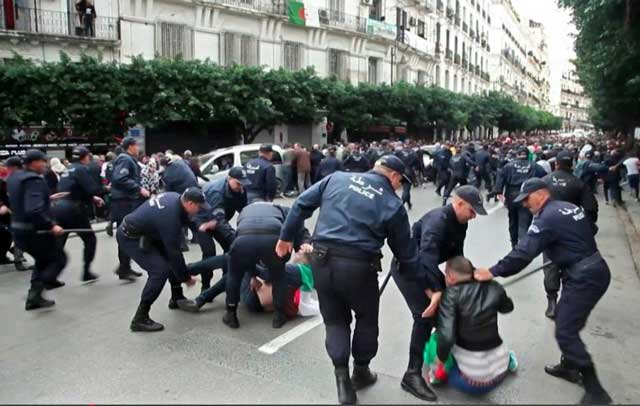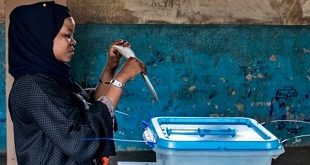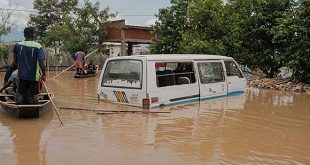
Algiers, Algeria | AFP | Algeria held a tense presidential election Thursday meant to bring stability after a year of turmoil, but voting was marred as protesters stormed polling stations and staged a mass rally in the capital.
The unpopular vote comes almost 10 months into a street protest movement that in April ousted president Abdelaziz Bouteflika, 82, after two decades in office.
Demonstrators have kept up weekly protests demanding an end to the military-backed political system.
Tens of thousands rallied Thursday in central Algiers, where all morning police with water cannon and helicopters tried to disperse protesters and prevent a repeat of the previous day’s anti-election demonstrations.
“The people want independence,” demonstrators chanted after breaking through a police cordon and filling the streets outside the Central Post Office, their symbolic meeting place throughout more than 40 weeks of protest.
AFP reporters saw a group storming a polling station in the capital, suspending voting there for about half an hour before police pushed them out again.
Late in the afternoon, an AFP reporter saw police using baton charges to disperse remaining protesters.
After dark, witnesses reported ongoing scuffles between police and protesters in the Belouizdad neighbourhood close to the city centre.
In the northern mountain region of Kabylie, home to much of the country’s Berber minority and historically opposed to the central government, protesters “ransacked the ballot boxes and destroyed part of the electoral lists”, a resident said.
Crowds surrounded a government building in Kabylie’s Tizi Ouzou, where security forces fired teargas to repel them, said witnesses in the region. They said the unrest, which had injured several people on both sides, continued into the night.
Videos from other cities also showed large demonstrations.
– ‘Mired in crisis’ –
The ballot features five candidates, all of them widely rejected by protesters as “children of the regime”.
Among them are two of the ousted leader’s former prime ministers — Abdelmajid Tebboune, 74, and Ali Benflis, 75 — and a former minister, Azzedine Mihoubi.
While only a trickle of voters cast their ballots in some districts, national television showed longer queues elsewhere, leading some online commentators to wonder “how much they have been paid”.
In central Algiers, young protesters slammed those casting their ballots as “traitors of the nation”.
That earned a sharp rebuke from one man in his 80s: “I fought for the right to vote, so I’m voting for my country.”
Voter turnout stood at just over 33 percent at 1600 GMT, nine hours after polls opened, said electoral authority chief Mohamed Charfi.
That was below the 37 percent recorded at the same time of day in elections five years ago, when total participation reached 50.7 percent.
Despite the protests, Charfi welcomed the “smooth running” of the election in “95 percent of voting centres”, as some voters said casting their ballots remained a duty.
“I am voting because I am afraid that the country will get mired in the crisis,” said Karim, a 28-year-old civil servant.
Sid Ali, a 48-year-old merchant in Algiers, said: “I support the Hirak (protest) movement but it needs to end. I lost 70 percent of my turnover and many traders are in my situation.”
Polling stations closed at 7:00 pm local time (1800 GMT), but the result may not be announced for another day or later, as was the case after previous elections also marked by abstention.
– ‘No to the system’ –
Whoever wins will struggle to be accepted by the electorate in the North African country, where many citizens see the government as inept, corrupt and unable to manage the flagging economy.
The “Hirak” street movement kicked off when Bouteflika announced in February that he would seek a fifth term in office.
Protesters have stayed on the streets ever since, demanding the total dismantling of the system that has ruled Algeria since independence from France in 1962.
The military high command, which long wielded power from the shadows, has been forced to take a more visible role and has pushed for the election as a way to withdraw behind the scenes again.
Demonstrators have vented their anger at army chief Ahmed Gaid Salah, who has emerged as Algeria’s de facto strongman since Bouteflika stepped down.
A previous poll set for July was scrapped for lack of viable candidates and interim president Abdelkader Bensalah’s term technically ended five months ago.
Given the broad opposition, the five candidates have run low-key campaigns, usually under heavy police protection and often being drowned out by hecklers.
 The Independent Uganda: You get the Truth we Pay the Price
The Independent Uganda: You get the Truth we Pay the Price


